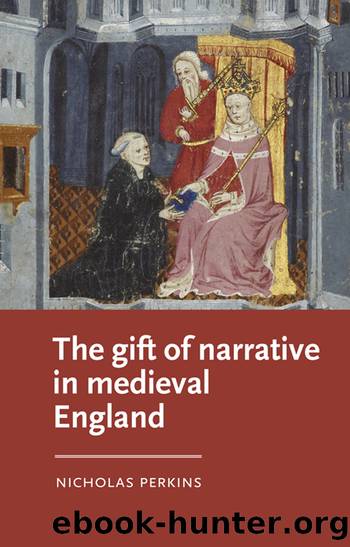The gift of narrative in medieval England by Nicholas Perkins

Author:Nicholas Perkins
Language: eng
Format: epub
Publisher: Manchester University Press
Troilus and Criseyde
Another major poem that Chaucer worked on in the 1380s, with its own series of exchanges with The Knight's Tale, as well as with source and intertextual material in Boccaccio, Boethius and elsewhere, is Troilus and Criseyde. Like the Knight, the narrating voice of the poem is figured as taking part in an exchange with his audience. But that voice speaks from the position of servant, compiler and reporter, opening up a plethora of relationships and possible exchanges between the text(s) and its audience(s). The narrative movement of the story is also conceived as a continual series of movements and exchanges:
The thynges fellen, as they don of werre,
Bitwixen hem of Troie and Grekes ofte;
For som day boughten they of Troie it derre,
And eft the Grekes founden nothing softe
The folk of Troie; and thus Fortune on lofte
And under eft gan hem to whielen bothe
Aftir hir course, ay whil that thei were wrothe. (I.134â40)
This is a beautifully sly passage, in which the greatest epic story in the Western tradition is summarized in a single stanza with the studied uninvolvement of a Frenchman describing a cricket match. It also diverts the audience's gaze from war as the prime subject of the poem, although that will keep soaking back into the structure, action and language of Troilus and Criseyde at many levels. Additionally, this stanza's very syntax is bound up in the give and take of the conflict, with its patterning of âTroie ⦠Grekes ⦠Troie ⦠Grekes ⦠Troieâ, the metaphor of âbuying it dearâ, and the image of Fortune's wheel, whose destabilizing yet inescapable action works its way through the enjambments of the final three lines of the stanza. Though the figure of Fortune does not make many overt appearances in Troilus and Criseyde, there is a looming sense throughout the poem of the cycles of pain and joy that are her prerogative.45 This includes the opening stanza of the poem, whose verbal patterning is echoed in the one quoted above:
The double sorwe of Troilus to tellen,
That was the kyng Priamus sone of Troye,
In lovynge, how his aventures fellen
Fro wo to wele, and after out of joie,
My purpos is, er that I parte fro ye.
Thesiphone, thow help me for tâendite
Thise woful vers, that wepen as I write. (I.1â7)
Calkas and Criseyde, the Greeks and Trojans, wo and wele, and the working of aventure(s) move in cycles from the very start of the poem, while the siege itself was provoked when Paris snatched away Helen. This illegal trafficking in women precipitates the whole hostile set of exchanges of violence, revenge and destruction. An inverse gift relationship of revenge is thus powerfully embedded in the poem's workings. When Troilus scorns all lovers as âveray fooles, nyce and blyndeâ (I.202), the God of Love âgan loken rowe / Right for despit, and shop for to ben wrokenâ (I.206â7). Troilus's glance is then imagined to be like an arrow, piercing a crowded temple and striking home in Criseyde (I.271â3).
Within the first movements of the
Download
This site does not store any files on its server. We only index and link to content provided by other sites. Please contact the content providers to delete copyright contents if any and email us, we'll remove relevant links or contents immediately.
| Ancient & Classical | Arthurian Romance |
| Beat Generation | Feminist |
| Gothic & Romantic | LGBT |
| Medieval | Modern |
| Modernism | Postmodernism |
| Renaissance | Shakespeare |
| Surrealism | Victorian |
4 3 2 1: A Novel by Paul Auster(12393)
The handmaid's tale by Margaret Atwood(7767)
Giovanni's Room by James Baldwin(7346)
Asking the Right Questions: A Guide to Critical Thinking by M. Neil Browne & Stuart M. Keeley(5775)
Big Magic: Creative Living Beyond Fear by Elizabeth Gilbert(5774)
Ego Is the Enemy by Ryan Holiday(5450)
The Body: A Guide for Occupants by Bill Bryson(5098)
On Writing A Memoir of the Craft by Stephen King(4944)
Ken Follett - World without end by Ken Follett(4734)
Adulting by Kelly Williams Brown(4574)
Bluets by Maggie Nelson(4559)
Eat That Frog! by Brian Tracy(4541)
Guilty Pleasures by Laurell K Hamilton(4450)
The Poetry of Pablo Neruda by Pablo Neruda(4109)
Alive: The Story of the Andes Survivors by Piers Paul Read(4033)
White Noise - A Novel by Don DeLillo(4012)
Fingerprints of the Gods by Graham Hancock(4004)
The Book of Joy by Dalai Lama(3986)
The Bookshop by Penelope Fitzgerald(3854)
